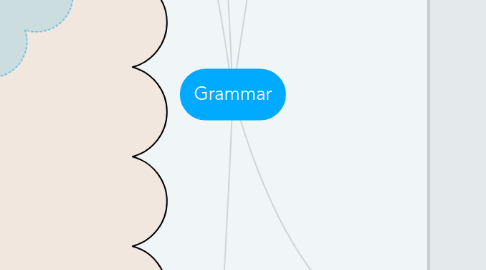
1. Adjectives and Adverbs
1.1. Adjective: words that are used to describe a nouns and prnnouns. Adjective come before noun.
1.1.1. Example: beautiful, clever, important.
1.1.1.1. She is a beautiful girl.
1.1.1.2. I do not think he is very clever.
1.1.1.3. This assignment is very important to you.
1.2. Adverb: words that are used to describe verbs or adjectives. It can be put before verb: I happily accepted his invite. It can be put after the verb: He walked slowly. It can be put at the end of a sentence: He talked to her very quietly. It can be put at the beginning of a sentence: Suddenly, he couldn't see anything. It can't be put between a verb and its object, there is a incorrect example: I go always out. The correct one is: I always go out. If there is auxiliary+ verb, it should be put between twon verbs: It had always been my favourite show.
1.2.1. Example: quickly, slowly, very.
1.2.1.1. He finished his meal quickly.
1.2.1.2. He came to me slowly.
1.2.1.3. He wrote his paragraph very carefully.
2. Why important? To make the sentences more lively, more beautiful.
3. Roots, Prefixes, and Suffixes
3.1. Root: words that are based on other languages.
3.1.1. Example: cent- one hunddred. multi - many. aqua - water.
3.1.1.1. 100 percent of people dont agree with him.
3.1.1.2. Canada is a multiculture country.
3.1.1.3. I have never been to that aquarium.
3.2. Prefixes: before a word, and the defination can be understand by knowing the meaning of prefixes.
3.2.1. Example: un - not. sub- under, anti - against.
3.2.1.1. Your action is unacceptable in this city.
3.2.1.2. Have you ever seen a subway?
3.2.1.3. He stole that anti-tank missile from ememy's base.
3.3. Suffixes: after a word, can change the meaning of words.
3.3.1. Example: est - most, ful - full of, er - more.
3.3.1.1. This building is the highest building I have ever seen.
3.3.1.2. This area is hotter than other areas.
3.3.1.3. It is a very useful tool.
4. Why important? To expand vocabulary, help people to understant more words and their definations.
5. Active and Passive voice
5.1. Active voice: subject+ verb + object, the atmosphere are stronger and smoother.
5.1.1. Example
5.1.1.1. I love you.
5.1.1.2. He saw a beautiful bird.
5.1.1.3. They found the lost wallet.
5.2. Passive voice: subject+ passive verb+ agent.
5.2.1. example
5.2.1.1. This building was designed by Tim.
5.2.1.2. This computer is destroied by my sister.
5.2.1.3. He was killed by the strange man.
5.3. Active voice and passive voice can be changed to each other.
5.3.1. Example
5.3.1.1. Active voice to passive voice.
5.3.1.1.1. A: I love you.
5.3.1.1.2. P: You are loved by me.
5.3.1.1.3. A: I called your name.
5.3.1.1.4. P: Your name was called by me.
5.3.1.1.5. A: I ate a duck yesterday.
5.3.1.1.6. P: A duck was eatten by me yesterday.
5.3.1.2. Passive voice to active voice
5.3.1.2.1. P: This article was written by Kayle.
5.3.1.2.2. A: Kayle wrote this article.
5.3.1.2.3. P: This tower was destroied by the typhoon.
5.3.1.2.4. A: The typhoon destroied this tower.
5.3.1.2.5. P: My phone was dropped by me yesterday.
5.3.1.2.6. A: I dropped my phone yesterday.
6. Why important? It helps to write sentence smoother and make sentence more easy to understand.
7. Articles and Prepositions
7.1. Article: the word that are used with nouns (usually refer to none).
7.1.1. Example: a, an, the.
7.1.1.1. There is a tree.
7.1.1.2. There is an apple.
7.1.1.3. The tree is a apple tree.
7.2. Preposiiton: usually is the connections between other words and its object. Phrase incledes preposition and object.
7.2.1. Example: in, on ,with.
7.2.1.1. The cat is on the table.
7.2.1.2. He is in the room.
7.2.1.3. I went there with my friends.
8. Why important? To make sentence and article more clear and smmoth.
9. Irregular Verbs and Verb Tenses
9.1. Irregular verb: verb that do not follow the "ed" rule.
9.1.1. Example
9.1.1.1. see - saw - seen
9.1.1.1.1. I saw a huge cat yesterday.
9.1.1.2. go - went - gone
9.1.1.2.1. I went to my new house last weekend.
9.1.1.3. run - ran - run
9.1.1.3.1. He survived from that accident, because he ran fast.
9.2. Regular verb: verb that follow the "ed" rule.
9.2.1. Example
9.2.1.1. work- worked - worked
9.2.1.1.1. I worked very hard yesterday.
9.2.1.2. live - lived - lived
9.2.1.2.1. I lived in Toronto for many years.
9.2.1.3. escape - escaped - escaped
9.2.1.3.1. He escaped from the terrible hospital.
9.3. Verb Tenses: it canshows the time.
9.3.1. Present: something that happens regularly.
9.3.1.1. I go to school everyday.
9.3.1.2. He eats breakfest everyday..
9.3.1.3. They go to climb mountains once a year.
9.3.2. Past: things that happened before.
9.3.2.1. I failed my math exam last month.
9.3.2.2. I went to school by bike yesterday.
9.3.2.3. He won a huge amount of money last year.
9.3.3. Future: things that will happen in the future.
9.3.3.1. I will go back to my home town.
9.3.3.2. I will give it back to you in 3 days.
9.3.3.3. He will go there by himself.
9.3.4. Past perfect: things that happened before other thing happened.
9.3.4.1. I had arrived there before you came.
9.3.4.2. He had finished his meal before he went to school.
9.3.4.3. I had seen you before you called my phone.
9.3.5. Present perfect: things that happens up to now.
9.3.5.1. I have lived here for 10 years.
9.3.5.2. He has worked with his friends for 10 hours.
9.3.5.3. I have written my homework for a whole night.
9.3.6. Future perfect: decribe action that are predicting for a time in the future.
9.3.6.1. By next year, I will have finished 5 essay.
9.3.6.2. By next week, I will have gone to there 3 times.
9.3.6.3. By next 10 years, he will have done his job for many times..

